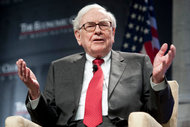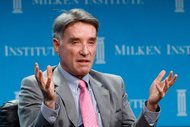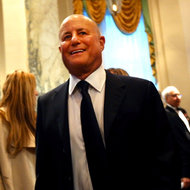He had already signed up a number of well-known Silicon Valley financiers, but he also dashed off a note to his old friend Dick Costolo, who had just sold his company to Google, asking if he would like to put in $25,000 or $100,000.
“I’m on the $25k bus,” Mr. Costolo replied three minutes after receiving the e-mail. “Thanks Ev, this will be a lot of fun.”
Mr. Costolo, who is now the chief executive of Twitter, is one of a handful of individual investors who stand to reap the rewards of a potential initial public offering of stock in the social network. The company said on Thursday that it had filed early paperwork with regulators to conduct such a sale, which will probably occur late this year or early next year.
Although many details are still unclear — most of all the offering price of Twitter’s stock — Mr. Costolo’s initial investment is probably worth more than $10 million, with additional shares he has received as an executive worth many millions more, according to people knowledgeable about the company’s finances.
Twitter declined to comment on its finances, citing the confidential nature of its I.P.O. filings at this stage in the process.
Mr. Williams, who provided crucial early financing for Twitter and remains its largest shareholder, will almost certainly become a billionaire. The venture investor Chris Sacca and at least two venture capital firms, Union Square Ventures and Spark Capital, will also most likely end up with stakes exceeding $1 billion each, according to an analysis of financial documents and interviews with people who know about Twitter’s finances. Others could make tens of millions or even hundreds of millions of dollars.
Not everyone will be so lucky.
Twitter struggled in its early days, even laying off employees as it tried to conserve its cash. Just two years ago, there were questions about its viability as it tried to figure out how to wring revenue from the endless stream of 140-character messages generated by its users. Many early investors and employees sold hundreds of millions of dollars of stock in 2011 to a Russian investment firm, DST Global, that was eager to buy in.
“To see it come to life and have it taken away, I was devastated,” said Dom Sagolla, an early employee of Twitter who was laid off in May 2006 and never received stock. While Mr. Sagolla has made some money by proxy from Twitter — he wrote a book that tells newcomers how to use the service and is doing some paid public speaking — he does not stand to benefit as Twitter heads to Wall Street.
Twitter’s I.P.O. will not be nearly as large as Facebook’s $16 billion offering last year, but it will still create a multimillionaires club of dozens of early believers.
“For me personally, this is a once-in-a-decade or once-in-a-career kind of investment,” said Bijan Sabet, a partner at Spark Capital, one of the earliest investors in Twitter.
If history is a guide, the money generated by the Twitter offering will also provide the seed money for the next generation of scrappy tech companies that could grow to compete with Twitter.
“When you have a successful I.P.O., it gives people confidence both in the public and private markets and they are directly correlated,” said James A. Moore, a senior executive at Columbia Business School’s entrepreneurship program and founder of J. Moore Partners, a technology mergers and acquisitions consulting firm.
Indeed, Mr. Williams and his other two co-founders, Jack Dorsey and Biz Stone, are no longer involved with daily operations at the company and have moved on to new ventures. Dozens of other very early employees have also left, although many still hold stock worth millions.
How many millions will depend on the final valuation placed on the company for the stock offering. Investment bankers will gauge investors’ interest in the stock and work with the company to set a price.
In March, Twitter set off a frenzy of interest after it said it was valuing the stock it was offering to employees at $17 a share, according to VC Experts, a private company data provider. That price implied that the company was worth more than the $8 billion valuation it had when it raised money in 2011.
Since then, interested parties have been willing to pay as much as $30 a share for a piece of the company in private transactions, according to Michael Pachter, an analyst at Wedbush Securities.
On the public stock exchanges, Internet companies have been surging. This week, investors have plowed money into companies like Facebook, Netflix and Pandora, sending their stock prices to record highs.
“Internet valuations are crazy right now and investors are willing to pay a lot for equity in Internet stocks,” Mr. Pachter said. “Twitter is taking advantage of this.”
In hindsight, some Twitter shareholders who cashed out early have expressed regrets. But “in our case, we are early-stage people, and we had had a remarkable run,” said one early investor who sold millions of dollars of stock in 2011, when the Russian investment firm was buying.
And then there were those who never got any stock at all, like Florian Weber, one of the earliest programmers at the company. He worked on the project before it was even fully separate from Odeo, the now-defunct company where it was hatched.
Mr. Weber, a German citizen, said he was hired as a contractor, not an employee, so he never received any stock options.
“Coming from Germany, it’s not something that I pushed terribly hard for,” said Mr. Weber, who often worked remotely from Hamburg and eventually tired of telecommuting.
“As far as I know, I’m the only one who does not have stock options,” he said. But he has no regrets. He eventually started his own company, Amen, in Germany, which was just sold to a bigger firm, Tape.tv. “I’m very happy with my life.”

Alexandra Stevenson contributed reporting from New York.
Article source: http://www.nytimes.com/2013/09/14/technology/the-payday-at-twitter-many-were-waiting-for.html?partner=rss&emc=rss







